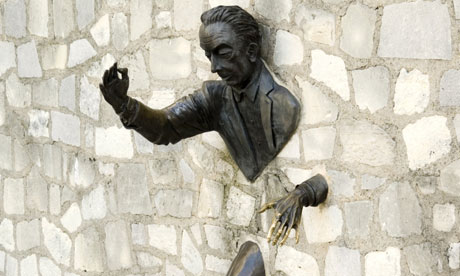This is the weekend when the clocks do something—spring forward, it must be—and from now on Daylight Saving Time will always remind me of Marcel Aymé, born 111 years ago this month, a writer of “fantastic” stories, not much translated into English.
I stumbled onto Aymé not via Twitter nor word of mouth nor any of the Intertubes but browsing in a bookstore, the kind with tables, on which were displayed neat stacks of books lovingly chosen by the staff. I picked up a collection titled The Man Who Walked through Walls, put out by an independent London publisher, the Pushkin Press. The beautiful translation is by Sophie Lewis.

Aymé is the kind of writer who makes you think of Borges (but that’s too easy, of course; it’s almost worrisome how often I’m put in mind of Borges). “The Man Who Walked through Walls”—”Le passe-muraille“—is his most famous story, the referent for his monument in Montmartre. The story that made me gasp with pleasure is the fourth, “The Problem of Summertime” (1943). For Americans, I think that should be “The Problem of Daylight Saving Time.” It’s about— well, never mind what it’s “about.” Let’s just say it expresses something about the nature of time that could not have been expressed, could not have been seen, until the invention of Daylight Saving Time (in French, l’heure d’été), along with time zones and the International Date Line and the other chronometric paraphernalia of modernity. The story is set in wartime. “At the height of the war, the warring powers’ attention was distracted by the problem of summertime, which it seemed had not been comprehensively examined. Already it was felt that no serious work had been carried out in this field and that, as often happens, human genius had allowed itself to be overruled by habit.”
How easily, the narrator remarks, time can be moved forward an hour or two! (His readers knew well that their German occupiers had just changed France’s time zone by decree.)
On reflection, nothing prevented its being moved forward by twelve or twenty-four hours, or indeed by any multiple of twenty-four. Little by little, the realisation spread that time was under man’s control. In every continent and in every country, the heads of state and their ministers began to consult philosophical treatises. In government meetings there was much talk of relative time, physiological time, subjective time and even compressible time. It became obvious that the notion of time, as our ancestors had transmitted it down the millennia, was in fact absurd claptrap.
So the authorities decide to do something dramatic. Never mind what. Something Borgesian. You could say that time travel occurs, if you construe the term time travel as broadly, as flexibly, as possible.
